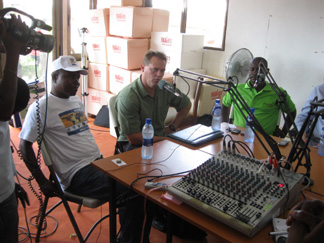Saturday October 16 marked my third day in Accra, Ghana representing AdFarm and Praxis Strategy Group at the National Food and Agriculture (FAGRO) show. We began the day with a deep dive into grower issues as panelist guests on an agriculture-focused radio program hosted by 90.1 Rite FM.
The panel included John Dziwornu, National Secretary of the National Association of Farmers and Fishermen; Myself (Colin Clarke of AdFarm); Tony Mensah-Abrampah of Praxis Africa; Jaques Magnee, commercial director for Raanan Fish Feed; and Andy, a farmer member of a Ghanaian Mango Cooperative.
As a panelist on the 2+hour radio program it served as a great opportunity to learn about the challenges faced by farmers. I was pleasantly surprised to find much common ground among North American and Ghanaian farmers. The similarities were stark:
- Farmers feel misunderstood and taken for granted. People do not understand the risks they bear to produce food. As long as there is food at the market people are unconcerned about farming.
- Farmers may only get one paycheck per year. There are no monthly paychecks like off-farm careers.
- Farmers take great pride in the job they do and often work under difficult conditions. There are no “days off” and farmers bear great risks.
When asked if farmers are difficult to work with, Andy of the Mango Cooperative answered, “Farming is a difficult job – we want to complain, so let us complain!” I loved Andy’s candor. He was brutally honest and very animated. Tremendous passion for his work as a farmer.
There was much discussion about lack of access to financing for Ghanaian farmers and the expense of finance options today. Farmers are commonly required to pay up to 22% interest on operating loans… if loans can be secured at all. Another farmer who joined the discussion stated the need for an insurance program that will protect farmers in case of crop loss so loans can be repaid. He stated instances where he has bore the entire expense of bringing a crop to harvest, then having NO market for his crop or losing his crop to a weather issue. There are many variables working against the farmer and very little assurances outside of some subsidies on crop inputs (fertilizer for example).
My observation is the entire agricultural structure in Ghana is in its infancy. There is need for farm safety nets (insurance programs), there is need for grower education programs on production, there is need for market access expansion, there is need for improved import laws, and there is incredible need for ag infrastructure that will allow farmers to expand production and deliver their crop to market.

An interview with Davies Korboe, Chairman of farmerdavies inc. and 2010 National Farmer of the Year reinforced many of these points. Davies is a highly diversified farmer raising a mix of crops and livestock. He would be considered a large farmer in Ghana, but even as a large farmer he is facing the same issues with financing, insurance, market access and infrastructure. He sees great opportunity for Ghanaian agriculture, but many issues to overcome.
Our final meeting of the day was with Philip Abayori, a farmer and President of a prominent Farm and Fisherman Association. A brilliant man, he has an amazing outlook for Ghanaian agriculture. He states there are 12 MILLION hectares of productive land in Ghana and less than 2% in active production today. He describes the different growing regions suitable for different ag industries: forestry, aquaculture, production agriculture and livestock. He envisons programs where farmers and industry professionals from each track can work together towards sustainable, well-managed production. He has great faith in the capabilities Ghanaian farmers.
My outlook towards agriculture in Ghana is one of opportunity. As we hear the “experts” tell us there is no more land available to feed the next 3 billion people I am encouraged to see places like Ghana with 12 million hectares waiting for production. Are these areas of the world forgotten? Places like Ghana can do their part to feed the world while strengthening the country’s agrarian economy at the same time. There is so much good to be done.
So where do you want to start?
Dr. Colin N. Clarke is a senior strategist for AdFarm. Follow him on Twitter @colinnclarke or on Facebook at Facebook.com/cnclarke












